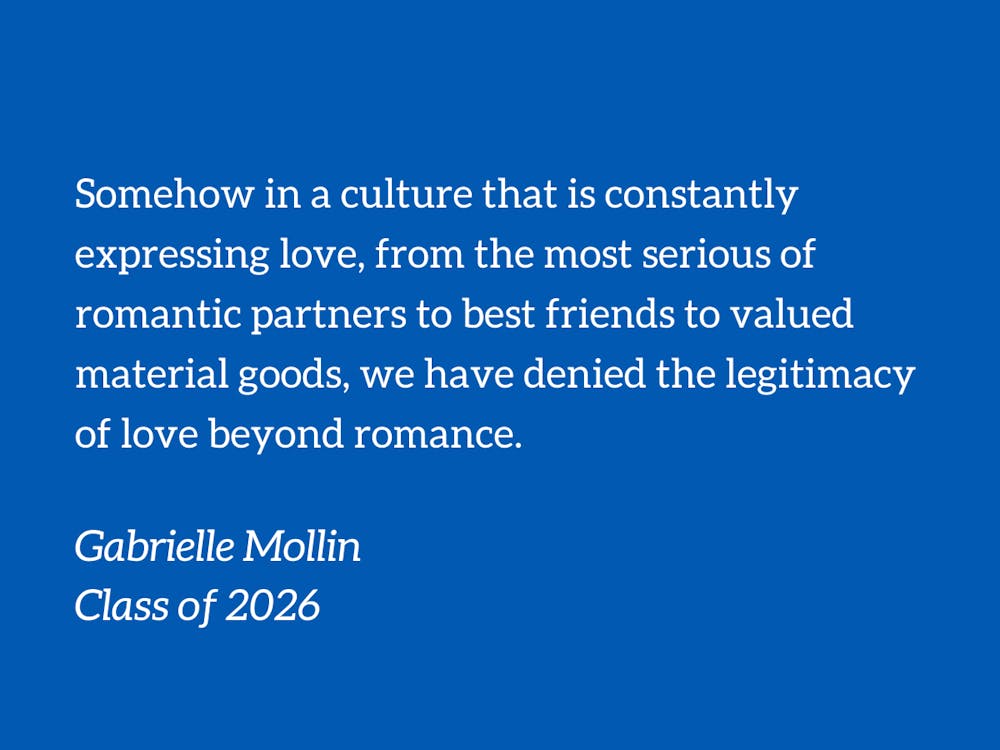There are approximately 7,117 languages in the world, marking approximately 7,117 different ways of expressing a feeling that connects people of all ages, races, genders and backgrounds across the world: love.
The Greeks have four different words for four types of love: philia, for friendship; eros, for romance; storge, for family; and agape, for unconditional love.
In Arabic, there are eleven stages of love: from initial simple attraction, or “hawa,” to a final maddening, irrational love, or “huyum.”
Spanish famously has te amo to say I love you. But also, there exists a more casual te quiero and the verb encantarse, to love.
Yet, in English, there is simply love.
Initially, I found English’s singular word for love unfortunately simplistic. While other languages embraced love for its complexities and boundlessness, devoting valuable linguistic capital to properly expressing the expansiveness of the feeling, English tethered love to one basic four-letter word. In comparison to many other languages, linguists have remarked on the lack of appreciation and exploration for the feeling of love in the English language.
I’ve come to realize, though, that this seemingly underdeveloped vision of love has created a culture that expresses love far more freely and frequently than its global counterparts. While the singular word love may seem like a shallow cop-out when put up against vast global exploration of love in all its forms, this simple word has given English speakers a perpetual outlet to feel love in many ways. Within this one four letter word is a culture teeming with love, readily expressed.
You can love your parents. You can love your sibling. You can love your partner. You can love Duke, or your classes, or your college friend group. You can love Kraft’s milkshakes and the pumpkin bread from Café. You can love when Duke beats UNC (GTHC). You can truly love just about anything in a language with a singular word for love, even love itself.
Though somehow, in this culture that linguistically promotes constant expressions of love, many remain fixated on one singular form of love — romance, of course. It is the most glamorous form of love, after all. With chocolates, roses and dinner dates galore, it's hard to deny the universal enticement. But by fixating on romance — and romance alone — we forget about how much love there really is out there.
And isn’t that a shame? It’s the day after Valentine’s Day, and likely, at least half of the world spent the day in resentment of the holiday. Why? Because somehow in a culture that is constantly expressing love — from the most serious of romantic partners to best friends to valued material goods — we have denied the legitimacy of love beyond romance. And oh, how much love that is to neglect!
Even further, we also tend to believe there are “right” and “wrong” ways to fall in love. Years of rom-coms and TV romances have conditioned us to believe in a singular idea of love. We yearn to fulfill classic tropes (“friends to lovers,” “enemies to lovers,” etc.). We crave the thrilling “chase,” ultimately desiring feeling “madly in love” with “the one.” But love is not this formulaic. Love is expansive and multi-dimensional and, most importantly, undefinable. It can feel like butterflies in your stomach but it can also be comfortable, warm, and stable. As long as it's real and honest, there is no right way to fall in love.
So, as we move onwards from this year’s Valentine’s Day, I hope you remember just how limitless love can be. There are endless ways to love, to be loved, to witness love and to spread love. Love is so much more than one word in the English language, and love is so much more than romance. Love is the joy you feel catching up with an old friend. Love is the selflessness of mothers for their children. Love is even the kindness of the stranger who held the door just a little bit longer for you. Love is just about everything, everywhere, all of the time.
Now, love it!
Gabrielle Mollin is a Trinity sophomore. Her column typically runs on alternate Thursdays.
Get The Chronicle straight to your inbox
Signup for our weekly newsletter. Cancel at any time.

